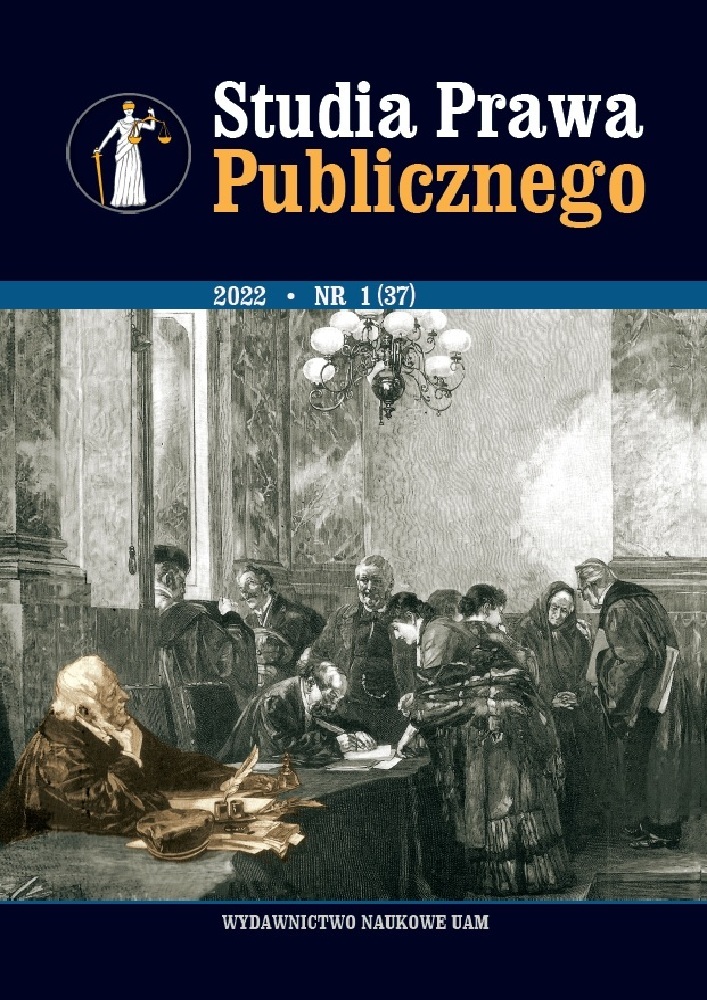Abstract
The article presents the issues of legal regulation of termination of pregnancy in the context of the jurisprudence of the Constitutional Court (CC), in particular the ruling in the case K 1/20.
The discussion opens with an analysis of models of abortion practices regulations, as well as the solutions adopted in the Polish legal system, with a short historical introduction. It is emphasized how important is the issue, which results from the fundamental differences in worldviews between the supporters and opponents of the permissibility of the practice of termination of pregnancy, which is expressed in the name given to this medical practice.
The right to life as an element of the human rights system is discussed, both in terms of international law and the provisions of the Polish constitution.
Next, the Polish provisions on the admissibility of termination of pregnancy are presented along with a historical outline, with particular emphasis on the ruling in the case K 26/96. Based on the above discussion, the resolution in the case K 1/20 was discussed, in which the CC found the so-called embryopathological premise for termination of pregnancy to be incompatible with Polish Constitution. A polemic with the justification of the decision is presented, including the errors of interpreta-tion committed by the CC with regard to the constitutional and international form of the right to the protection of life. It is indicated that in the Polish legal system only the right to protection of life exists, not the right to life, which is referred to both by the CC and most of the doctrine.
Despite the fact that this resolution does not remove the norm from the legal system, the author draws attention to the practical consequences of issuing it, in particular the occurrence of the so-called ‘chilling effect’ and unjustified activity of the law enforcement authorities.
The final part of the article presents conclusions on how to legally regulate the termination of pregnancy.
References
Haberko J., Cywilnoprawna ochrona dziecka poczętego a stosowanie procedur medycznych, Warszawa 2010.
Kędzia Z., Prawo do życia, w: Prawa człowieka. Model prawny, pod red. R. Wieruszewskiego, Wrocław–Warszawa–Kraków 1991.
Kojzar K., NFZ o śmierci Izabeli z Pszczyny: To błędy lekarskie. Ani słowa o wpływie zakazu aborcji, (dostęp: 9 III 2022).
Komisja Konstytucyjna Zgromadzenia Narodowego, Biuletyn nr XLV, Warszawa 1997.
Łętowska E., Wokół wyroku Trybunału Konstytucyjnego w sprawie aborcji, https://konstytucyjny.pl/ewa-letowska-wokol-wyroku-trybunalu-konstytucyjnego-w-sprawie-aborcji/ (dostęp: 6 I 2022).
Morawska E., Klauzula państwa prawnego w Konstytucji RP na tle orzecznictwa Trybunału Konstytucyjnego, Toruń 2003.
Nawrot O., Nienarodzony na ławie oskarżonych, Toruń 2007.
Nice D.C., Abortion Clinic Bombings as Political Violence, „American Journal of Political Science” 1988, vol. 32, no. 1.
Partridge E., Davey M., Hornick M. et al., An extra-uterine system to physiologically support the extreme premature lamb, „Nature Communication” 2017, vol. 8.
Przyłuska-Fiszer A., Etyka i przerywanie ciąży, w: Bioetyka, pod red. J. Różyńskiej, W. Chańskiej, Warszawa 2013.
Słownik języka polskiego PWN, hasło: aborcja, https://sjp.pwn.pl/szukaj/aborcja.html (dostęp: 8 I 2022).
Sroka T., Komentarz do art. 38, w: Konstytucja RP. T. 1. Komentarz: art. 1–86, pod red.
Safiana, L. Boska, Warszawa 2016, System Informacji Prawnej Legalis.
Szudejko P., Kazus Alecka Bourne’a a konstytucyjne zasady ochrony życia i zdrowia, „Studia Prawa Publicznego” 2021, nr 2(34).
Szymczak J., „Wolność, równość, aborcja na żądanie!” Tłumy pod kurią i pałacem prezydenckim, protesty w całej Polsce, https://oko.press/wolnosc-rownosc-aborcja-na-zadanie-tlumy-pod-kuria-i-palacem-prezydenckim-protesty-w-calej-polsce/ (dostęp: 6 I 2022).
The Chilling Effect in Constitutional Law, „Columbia Law Review” 1969, vol. 69, no. 5.
Theus J., Czekałam na śmierć własnego dziecka. Jestem ofiarą wyroku TK, jak Izabela z Pszczyny, https://oko.press/czekalam-na-smierc-wlasnego-dziecka-tez-jestem-ofiara-wyroku-tk (dostęp: 9 III 2022).
Tokarczyk R., Prawa narodzin, życia i śmierci, Lublin 1984.
Wiak K., Komentarz do art. 152 KK, w: Kodeks karny. Komentarz, pod red. A. Grześkowiak, K. Wiaka, Warszawa 2021, System Informacji Prawnej Legalis.
Wiak K., Ochrona życia i zdrowia dziecka w prawie karnym, w: Prawo karne w ochronie praw dziecka, pod red. A. Grześkowiak, I. Zgolińskiego, Bydgoszcz 2018.
Wróbel W., Konstytucyjne gwarancje ochrony życia a przesłanki dopuszczalności aborcji, w: Konstytucyjna formuła ochrony życia, pod red. M. Królikowskiego, M. Bajor-Stachańczyka, W. Odrowąża-Sypniewskiego, Warszawa 2007.
Zajadło J., Formuła Radbrucha. Filozofia prawa na granicy pozytywizmu prawniczego i prawa natury, Gdańsk 2001.
Zieliński M., Wykładnia prawa. Zasady. Reguły. Wskazówki, Warszawa 2002.
License
Copyright (c) 2022 Piotr Szudejko

This work is licensed under a Creative Commons Attribution-NonCommercial-NoDerivatives 4.0 International License.
